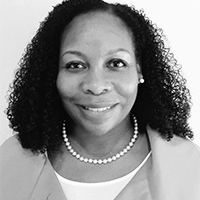Lt. Col. Nicole Hayes, Ph.D.
Board Treasurer & Inaugural Desi Benet Social Change Fellow
Hello! My name is Nicole Hayes. I grew up in Fort Lauderdale, Fla. and lived in Atlanta, Ga. Since joining the military I’ve enjoyed the opportunity of living in numerous locations stateside and abroad. In addition to serving on the Institute’s Board of Directors, I am also a member of Institute’s first cohort of fellows.
I recently attended Walden University, completing a doctorate in Public Policy and Administration. I also serve as a Lieutenant Colonel in the U.S. Army, and am currently assigned to the Pentagon. I am a graduate of Auburn University with a Bachelors in Mass Communications, and a graduate of Webster University with a dual MA in Human Resources and Management.
As a member of the Institute’s Board of Directors, I look forward to promoting Polarities of Democracy to assist in promoting healthy, sustainable, and just communities. It is my intent to promote the use of the theoretical framework in the academic community. I would also like to see this approach used in organizations outside of the academia world to assist management in balancing organizational concerns in order to create positive social environment.
Applying the Polarities of Democracy theory aligns with the concentrated area of my doctorate program in Public Policy and Administration, and the model supports the work I intend to do during my Institute fellowship.
Having been in the military for over 20 years, I’ve seen the effects of transition first hand on military adolescents, and thereto my passion lies for adolescents. I’m a strong advocate for support programs for military adolescents and as well as adolescents in general.
Having seen the effects of transition/moves on military adolescents, and military adolescent behavior in overseas communities, my fellowship project seeks to understand the challenges this population experiences when they transition and reside in a multicultural overseas community. Adolescents already encounter typical stressors as they enter puberty. Couple the traditional stressors with cultural differences, language barriers and transition can be challenging.
It is these compounded additional stressors this specific project seeks to understand.
Polarities of democracy can assist in identifying (based on pairs) and developing policies to ensure a community is conducive to support military adolescents, with effective policies in place to support community personnel who can assist in creating a democratic process to manage family programs.
As a researcher, it is my intent this research project will shed light on the importance of military adolescents by gathering military adolescents feedback, as well as parents’ perceptions, to better understand how their challenges and stressors are critical to being considered when policy leaders are creating family programs.
Gaining insight into their challenges, understanding the effects on transition, and acknowledging concerns of residing in a multicultural overseas community are important concepts to use as a foundation for development of family programs.

